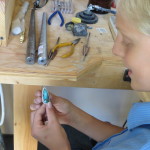
(Affiliate Link)
Quote by Geoffrey Colvin in chapter 5 of his book “Talent is Overrated: What really separates World-Class Performers from Everybody Else“:
“in sports generally, seeing the results of practice is no problem…Difficulties arise when the results require interpretation. You may believe you played that bar of the Brahms Violin Concerto perfectly, but can you really trust your own judgment? Or you may think that your rehearsal of a job interview was flawless, but your opinion isn’t what counts. These are situations in which a teacher, coach, or mentor is vital for providing crucial feedback”.
Geoffrey Colvin explains that mentors often play a big role in many of the very talented people. I agree. But actually finding a mentor for your minor child can be a difficult task for you as a parent to accomplish in getting your child to grow in his 10,000 hours of talent. Thankfully not every field of talent needs a traditional mentor, at least not at every point in the process on the path to becoming super-talented. Nonetheless, if you can enlist the help of some type of a mentor for your child, it makes the journey a lot easier.
Here are the two common difficulties when trying to find a suitable mentor or coach for your child:
- Difficulty #1: finding an expert who has experiences that could actually benefit your child, but who is not willing or capable of sharing with a younger person
- Difficulty #2: finding an expert who is actually willing to share and has great experiences in the particular talent field, but whose personal life is so out of control that it could inadvertently harm your child
The workaround to difficulty number one can often be found by going online to specialized forums where experts give advice to each other about their talent. They are often willing to dispense kind tips to beginners who are showing themselves serious.
The workaround to difficulty number two can often be found by breaking down the skills into still further sub-skills and then to go find new and different mentors that match up to those sub-skills.
The younger the child, the more you may want to consider the strategy of enlisting the help of multiple mini-coaches or mini-mentors. The older the child, the more your child will be able to sell himself to a skeptical mentor by the evidence of the work he would have already accumulated. The older the child, the more he will also be able to separate a person’s great expertise in one area from any of the mentor’s personal ethical problems that are outside his craft.
Whatever the relationship with mentors, always stay in charge. Do not let yourself be substituted as the parent when giving the ethical direction to your child’s life. A beloved coach or mentor should be respected for the value he adds to your child’s life, but the mentor should not be expected to carry the burden and responsibility of being a substitute parent.



